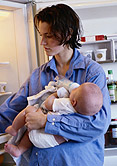
FRIDAY, Feb. 27, 2015 (HealthDay News) — Some babies spit up more than others, but it doesn’t necessarily mean they have a problem, an expert says.
A baby’s stomach is small and can tolerate only small amounts of food. As a baby grows, so does his or her stomach and spitting up becomes less common, explained Dr. Josephine Dlugopolski-Gach, an assistant professor in the department of pediatrics at Loyola University Chicago Stritch School of Medicine.
Also, the esophageal sphincter — the flap that keeps stomach contents from coming back up — is not fully functional in babies, she explained.
“Babies typically outgrow spitting up by 6 months. This is when the stomach muscles and the flap that keeps food in the stomach matures. Also, when babies start eating more solid foods and sitting up, spit-up becomes less frequent,” Dlugopolski-Gach said in a university news release.
“There are medications to help reduce the discomfort of frequent spitting up, but they usually do not help with how often the child is spitting up. Your pediatrician can help decide if the medication is right for your child,” she said.
You can reduce spitting up by: burping your baby after every 1 to 2 ounces or 5 to 10 minutes of feeding; holding your baby upright for several minutes after feeding; and by putting the baby in a car seat or swing for 30 minutes after feeding, Dlugopolski-Gach suggested.
While normal, spitting up can be a warning sign of a bigger problem if a baby also has poor weight gain, vomits bile or blood, cries constantly and is inconsolable, is lethargic and has decreased urine production or projectile vomiting, Dlugopolski-Gach said.
More information
The American Academy of Family Physicians has more about spitting up in babies.
Copyright © 2026 HealthDay. All rights reserved.

